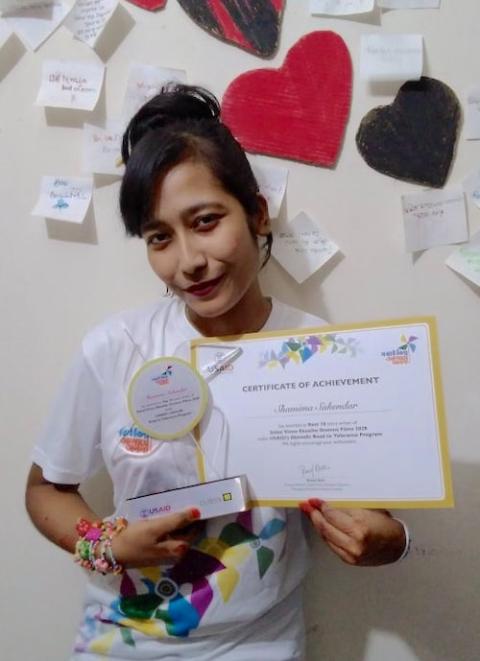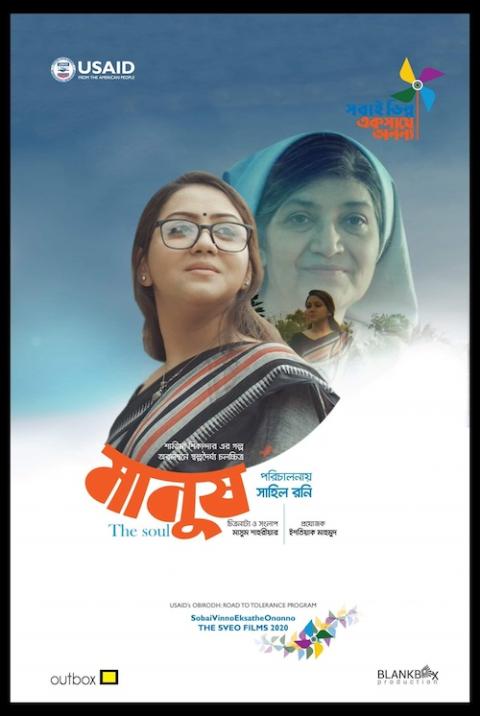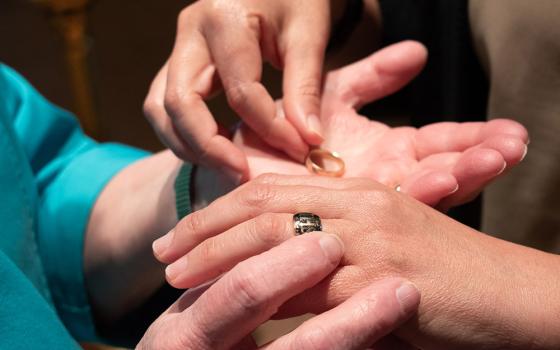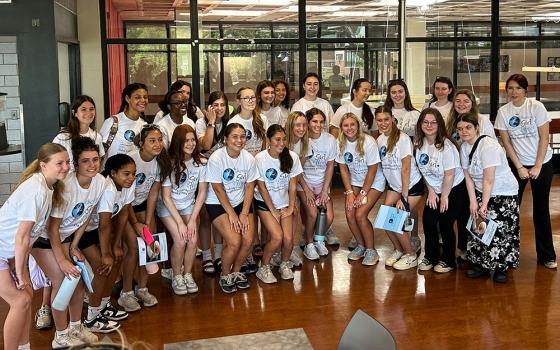Students of Holy Cross College celebrate after they learn the results of their Higher Secondary Certificate exam in 2019 (Sumon Corraya)

Shamima Sakendar poses with the trophy and certificate she received after her story was chosen as one of the top 10 stories of SEVO Films under USAID's Obirodh: Road to Tolerance Program. (Sumon Corraya)
Shamima Sakendar, a Muslim university student, wrote a story for a competition on the pastoral life of Sr. Shikha Laetitia Gomes, a Holy Cross sister and principal of Holy Cross College in Dhaka.
Sobai Vinno Eksathe Ononno Films 2020, a project of USAID's Obirodh: Road to Tolerance Program, selected her story as one of the top 10 out of the thousands of short-story submissions on religious harmony and turned it into an 11-minute-long film, "The Soul," and recently released on national TV, Facebook and YouTube. The film is in Bengali but has English subtitles for an international audience. After its release, the film received a lot of admiration on Facebook and YouTube.
"I wrote the story to reveal how a Catholic nun has been contributing for students from all faiths," Sakendar told Global Sisters Report. "I personally got help from Sr. Gomes while my unemployed father could not pay my tuition in 11th and 12th grade. I observed that those who are truly needy get help from the college's charity fund with the nun's leadership. In addition to financial support and academic lessons, she also provides us education for life. She is a transformer for female students. She helped me to see a dream in my life."
In the film, a needy Muslim school girl stops attending school. A nun visits that girl's house and learns she is unable continue her studies because her family cannot afford it. The nun helps her financially and emotionally.
Sakendar, 20, said she would not be able to continue to attend university without Gomes.
"I wanted to say no religion is bad, and we should respect all religions. This is how peace could be established. Establishing religious harmony is important," she said.
The film is a project of filmmaking organization Outbox with BlankBox Production and support from the U.S. Agency for International Development (USAID). It aims to promote religious harmony, tolerance and interfaith dialogue and to increase understanding of cultural diversity.
In Bangladesh, Christians often are persecuted by Muslims, who make up 89% of the population. Even Muslims who attend missionary schools and colleges face barriers. As Sakendar said: "My relatives did not want me to study at Holy Cross College. They told me Christians are not holy, but I obtained an education from that college, and I think I got the best education from there for my life."
Holy Cross College is one of the country's top colleges for women with 2,600 students, most of whom are Muslim, where the nuns' culture promotes good behavior, doing good and kind work, and living holy lifestyle.
Gomes has said she was happy to hear a film had been made about her life and thanked Sakendar.

Promotional poster "The Soul" short film (Provided photo)
GSR: Can you tell us the background of "The Soul"?
Sakendar: An important time of my student life was at Holy Cross College. When I enrolled in the college, my father was unemployed. At that time, our family's costs were provided by our maternal uncle, who lived abroad. My father did not have the ability to enroll me in college that time, but my mom sold her own gold necklaces and enrolled me in college. She also bought me shoes and a college uniform that I used for two years.
In my first several months at the college, I got help from my uncles, or my mom borrowed money from a neighbor or my elder sister, who earns money as a tutor. Later, the sisters announced at the college that a form will be distributed for needy students. I collected it. Later, the college told me to bring my mom, who shared about my father's unemployment. This is how my application was approved to get financial aid. My college fee of 1,600 taka ($18.88) was cut in half for me. It was a blessing.
I realized that a nun considered my situation and granted a half-tuition fee though she is Christian. In "The Soul," I wrote about the communal mentality of nuns. I mention religious harmony.
Why did you write your story about Sr. Gomes?
Sr. Gomes was the best example of religious harmony for me. I thought if I could write a nice story on her and it becomes film, everyone in the country will know about the beauty of religious harmony.
I do believe film is a strong way to reach all kinds of audiences easily with a message. I wanted to explain through "The Soul" how a nun is transforming society by her good and kind work for all faiths.
I also think if this kind of film was produced more, one day, religious extremism will decline in our country. This kind of film will make a country of religious harmony. This young generation should take more of this kind of initiative so that they can understand and hold religious harmony.
Sr. Shikha Laetitia Gomes at her office at Holy Cross College in Dhaka, Bangladesh (Sumon Corraya)
What is your favorite part of "The Soul"?
I liked most when the nun visits her student's home after noticing she was absent at school. Later in the film, the nun helped that schoolgirl in her moment of helplessness. I think Sr. Gomes and other nuns are still helping in the country and positively transforming those girls' lives.
When Sr. Gomes learned that a film was produced about her, she was very happy. It made me happy, too. My maternal uncle and his wife also were very happy when they learned about my story and film. They congratulated me. My parents and all my relatives were happy for my story and my success.
Has Holy Cross College changed your life in a positive way?
I discovered myself by studying at their college. I learned I can do work by discipline. Before I attended the college, I felt inferior when talking with others, but I could remove that sense of inferiority through my studies. At this college, students come to study from all districts of the country and from all faiths.
The college taught me religious harmony. During tiffin time, we shared our food. I never could speak in front of a microphone previously, but during assemblies, I led prayers at college. In a handicraft competition, I came in third place and was awarded. This college helped boost my hidden talents.
Advertisement
Which of Sr. Gomes' lessons do you like most?
I love Sr. Gomes very much. I got huge motivation from her class. She taught us not only from academic books, but also from other sources.
She told us: "Always talk with eye contact. Eye contact is so important." From that day, I learned to tell the truth with eye contact. Because of the color of my skin, I grew up hearing many insulting words from people, but I now keep in my mind that Sr. Gomes told me that I'm the most beautiful lady in the world and I'm the emperor of my own world. I still practice it in my life, and that makes me confident.
Sr. Gomes also taught us: "Girls, on Dec. 31, sit with a diary and write what this year you wanted to do but could not do successfully. Write it in your dairy for next year. Also write what you successfully did."
Why was Holy Cross College the top college for you?
Beside providing a quality academic education, its aim is to provide formation to young female students to boost their personalities with leadership power. This college helps boost the hidden power of female students.
Teachers understand students' reality of life. Teachers conduct different cultural programs and extracurricular activities which help students in the future. As a result, students can speak publicly, they can conduct programs.
We learned discipline and to be punctual. We students from different religions did all of our activities with religious tolerance and harmony. The college's song is: "Holy Cross, we shall be loyal. Holy Cross, we shall be truth."
While I studied in the college, nuns observed our clothes, socks. If anybody wore unclean clothes or socks, as punishment, they made us write 200 times, "I will not do it."
What is aim of your life?
My mom wanted me to be a lawyer. I also took it as my life's aim, but I could not enroll in any law college. Now, I am studying economics at a state-run college, but in the future, after graduation, I will take law courses. I want to be a lawyer on the Supreme Court.
Besides becoming a lawyer, I will continue writing stories. I will feed needy people from my income, and, if possible, I will help make housing for those who are homeless.
Do you want to say anything else?
Through a campaign of the Youth Empowerment Forum, I could write "The Soul," a story that helped me boost my talents. I want to encourage other youths of our county to get involved in this youth organization. It promotes a Bangladesh in religious harmony. Religious harmony is important to make a peaceful nation and world.
[Sumon Corraya is a Catholic journalist based in Dhaka, Bangladesh. He covers issues affecting the Christian community in Bangladesh.]







